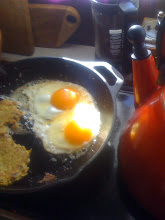I have been asked what I mean by, or why it matters to be, a new hunter-gatherer. I used the phrase casually one day to describe what I had been doing, going all over the place in this big city, trying to assemble what I might feel good about feeding to my family. Rick and I knew immediately. "That's it, that's what you do," he said. "You are The New Hunter Gatherer." And, in this very confusing commercialized foodway that is America, we all have to be hunter-gatherers. We cannot just go to the closest grocery store and passively accept the junk-pretending-to-be-food lining the shelves and filling the cases. We have to be in charge, be mindful, and start choosing what we eat. Yes, it's more work, and yes, it's more expensive. And, yes, sadly, there are some who cannot afford to do this--yet. But if we who can abdicate our responsibility to seek out the best that is available, the choices will evaporate and we will be left with food mimics forever.
So I hunt, from store to farm, backyard garden to fishing friends. I gather the bits that will form wonderfully rich and nourishing meals, reminiscent of what our great-grandmothers might have made. Saturday's meal of locally/sustainably raised tilapia will also provide stock from it's bones for another meal, a seafood stew or curry, with herbs and vegetables from our CSA. For that's another hallmark of the hunter-gatherer (HG, as I can see I'll be writing it alot) approach: Don't waste what you have. Fergus Henderson has popularized "nose-to tail" eating, but this has been around forever. In the South, some say we eat everything but the "oink." We do this because it is thrifty, and because the inventions using "the nasty bits" are delectable (thanks, Anthony Bourdain, for making this delicously visual). And, it turns out, we do it (unconsciously for most) because these parts, the offal and bones and shells, are the most nutritionally dense foods we could be eating. How crazy is it that "civilized" people have grown away from using everything, every part? It's no wonder that diseases of civilization have followed . . .
Draining the Swamp: The Real Story Behind NESARA
22 hours ago






No comments:
Post a Comment